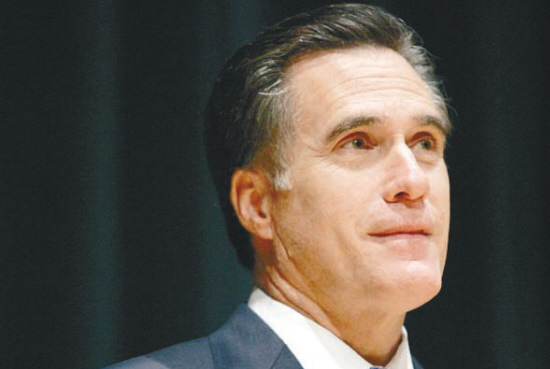Mitt Romney (R.)
 0 Comment(s)
0 Comment(s) Print
Print E-mail China.org.cn, April 5, 2012
E-mail China.org.cn, April 5, 2012
|
|
|
Mitt Romney |
Mitt was born in Detroit on March 12, 1947. His mother, Lenore, gave up an acting career when she met and married his father, George. Mitt's father came from humble origins and never graduated from college. He apprenticed as a lath and plaster carpenter and sold aluminum paint before beginning a career that brought him to the head of American Motors and then the governorship of Michigan.
Mitt married his wife, Ann, in 1969. They first met in elementary school when he was a Cub Scout; he remembers tossing pebbles at her when she rode by on a horse. When they met again years later at a friend's house, he was smitten. Between them, they have five sons and sixteen grandchildren, who are the center of their lives.
Like any family, the Romneys have faced hardship: Ann was diagnosed with multiple sclerosis in 1998, and more recently fought a battle with breast cancer. She credits her husband's unwavering care and devotion to her for helping her through these ordeals.
Mitt is not a career politician. He has spent most of his life in the private sector, giving him intimate knowledge of how U.S. economy works. But he has also been an outstanding public servant. In one chapter of his distinguished career, he reversed the decline of a state mired in recession. In another chapter, he salvaged the 2002 Winter Olympic Games from certain disaster.
When Mitt was elected Governor of Massachusetts in 2002, the state was in severe disarray, its budget was out of balance, spending was soaring, and taxpayers were being required to pay more and more in taxes for diminishing services. The state economy was in a tailspin, with businesses cutting back on investment or even closing and unemployment ticking up. Mitt made hard decisions that brought state spending under control. He restructured and consolidated government programs, paring back where necessary and finding efficiencies throughout.
Facing a state legislature dominated by Democrats, Mitt cast more than 800 vetoes as he brought conservative principles to state government. He cut red tape for small businesses, signed into law job-creating incentives, and fought hard to bring new businesses to the state. He eliminated a $3 billion deficit without borrowing or raising taxes. By 2007, at the end of Mitt's term, the state had accumulated a $2 billion rainy day fund in its coffers. This stringent fiscal discipline provided an essential backdrop for economic recovery. When Mitt came into office, the state was losing jobs every month. When he left office, the economy was generating new jobs by the thousands.
In 1999, the Salt Lake City Winter Olympics was on the verge of collapse. Thanks to his reputation as a superb manager, Mitt was asked to take over. The event had been bogged down in a bid-rigging scandal, sponsors were fleeing, and the budget was bleeding red ink. The attacks of September 11, 2001, just months before the start date, created a security nightmare. Some were contemplating scaling back the competition or even moving it out of the country.
Mitt set to work. In a remarkably short period, he revamped the organization's leadership, trimmed the budget, and restored public confidence. He oversaw an unprecedented security mobilization to assure the safety of the athletes and millions of international visitors, staging one of the most successful games ever held on U.S. soil.
Mitt's impressive skills did not come out of nowhere. He began his career in business.
After graduating from Brigham Young University in 1971, he earned dual degrees from Harvard Law and Harvard Business School. After working as a business consultant for several years, Mitt founded the investment firm Bain Capital in 1984. Under his leadership, Bain Capital helped to launch or rebuild hundreds of companies, including household names such as Staples, Bright Horizons, and The Sports Authority. As Bain Capital was growing in prominence, Mitt returned to his old consulting firm, Bain & Company, as CEO. In a time of financial turmoil at the company, he led a successful turnaround.
(Source: mittromney.com)






